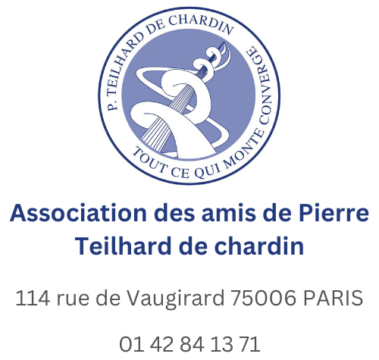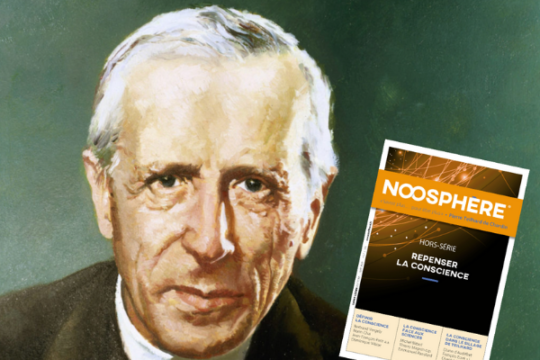Dear friend,
[…] you will therefore thank on my behalf, very deeply, M.B. [il s’agit de Maurice Blondel], for the interest and confidence he has shown in me : and, if you think fit, you will communicate to him the following reflections, which I have made about his Observations.
– First of all, there are two essential points on which M.B and I absolutely agree :
– a) first of all (this is obvious) on the fact that Christ must be loved as a World, or rather as the World, that is to say as the physical center (of ultimate determination, and of true consistency) imposed on all that must survive of Creation.
– b) but also […] on the capital and definitive role […] played by the renunciation and the asceticism in the construction of the new Universe. I admit fundamentally that the completion of the World is consumed only through a death, a ” night “, a reversal, an excentration and a quasi-personalization of the monads. The aggregation of a monad to Christ presupposes a kind of internal disintegration, that is to say, a reworking of its whole being, a condition for its re-creation and integration into the Pleroma. Union with Christ essentially implies that we place the ultimate center of our existence in him, which means the radical sacrifice of selfishness.
– This being said, how can we conceive of ascetic death, the mystical night, Christian renunciation ? What is the mechanism, the structure ? – it seems to me that it is on this point […] that M.B. and I differ in something ; it is this something that we should try to specify. – To this end, I will re-state here, […] my current position. […]
– The first form of renunciation that presents itself to the mind is that of an entrenchment, of a break with the World […] Do you want to find God ? Close the exits through which the false external life arrives. When you have done this, “ ipso facto “ [de fait], the higher Light will shine within you. […]. For there are two entirely separate lights that illuminate you. There are two different words that continually ring out in you. To distinguish one, you have to smother the other. […]
What I reproach to the renunciation understood as I have just said It is not viable for the whole of humanity, nor does it provide a general solution to the problem of our attitude towards the supernatural, nor does it provide us with the maximum possible union with Christ here below.
Let me explain.
– In each of our lives, there is an immense and necessary part reserved for positive operation, for natural and socialhuman effort. This effort is imposed on us by external circumstances, as a punishment. But it also possesses a spiritualizing value of the first order, either by the moral ” ” training that it gives to our activity, or also by the positive results that it provides us, by its work. Who will say what our mystical life, the most supernatural, owes to Plato, Leibniz, Pascal, Newton, and to how many others (much more unexpected) that each of us could name in his heart ? – who would dare to foresee all that the human soul is still capable of acquiring in terms of natural powers that can be immediately supernaturalized (as, for example, it becomes more fully aware of its solidarity with the Universe and of the spiritual regions, still unexplored, promised to the ” unanimity ” of spirits) ? – Who could affirm that Charity, weaned on sap and human struggle, would not wither in the bosom of a World transformed into a convent ?
There is, in the timetable of each life, and in the history of the whole human race, an enormous lot of positive achievements, which it is impossible, which it would be disloyal, to let abort. – it is absolutely necessary, so that Christ is as great as my life (that all of Life) that I may be conscious of growing in Him, not only through the ascetic restrictions and the (supremely unifying) uprootings of suffering, but also through all that my existence entails of positive effort, of natural perfection, of human duty. – It is necessary ; – otherwise it is the courage to act which is taken from me by Christianity, and it is the disgust which takes me in front of a whole side of my life which Religion deflowers without giving me the right to make it fall. […]
Faithfully yours in X
Teilhard
(Lettres intimes, Aubier Montaigne, 1974, pp. 30-32)
Text proposed by Francine Renaudeau – La Baule-Escoublac reading group






